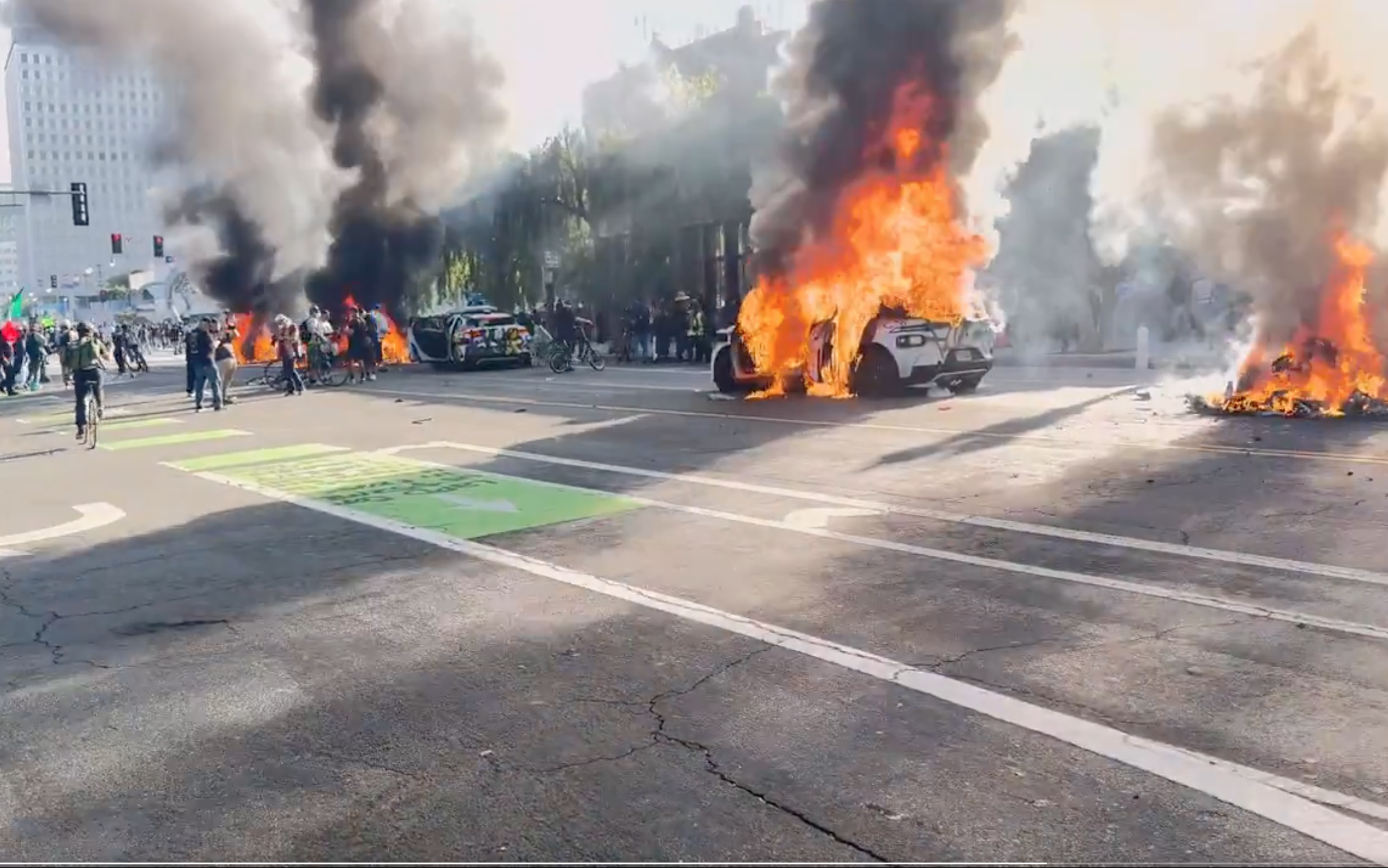
LOS ANGELES, June 9, 2025 – Tensions have flared dramatically in Los Angeles as widespread protests erupted in response to recent federal immigration raids, igniting confrontations with law enforcement, causing significant public disruption, and drawing sharp reactions from the highest levels of government. These demonstrations, marked by acts of vandalism and strategic blockades across areas like downtown Los Angeles, Paramount, and Compton, reflect a deep-seated public outcry against the government’s aggressive immigration enforcement policies.
The core reason for the demonstrations, which intensified over several days beginning on a Friday in early June 2025, centered on opposition to recent federal immigration enforcement actions carried out by Immigration and Customs Enforcement (ICE) officers. These operations reportedly occurred in areas with prominent Latino populations, including the Westlake District and near the Metropolitan Detention Center in downtown Los Angeles. Protesters engaged in direct confrontations with police forces, leading to volatile exchanges across various parts of the city. One of the most disruptive actions saw thousands of demonstrators blocking the vital 101 Freeway in downtown Los Angeles, severely impacting traffic flow and daily commutes for thousands of residents. Beyond the blockades, the protests escalated with instances of property destruction. Waymo taxis, part of a prominent autonomous vehicle service, were reportedly vandalized and set ablaze, sending plumes of smoke over the downtown landscape. Furthermore, protesters threw concrete, bottles, and various other objects at police officers, signaling an intense and often chaotic environment. In response to the unrest, the National Guard was deployed to assist local law enforcement in managing the crowds and restoring order. During the protests on a recent Saturday, approximately 30 individuals were arrested, with three suspected of assaulting an officer. The Federal Bureau of Investigation (FBI) has since offered a $50,000 reward for information leading to the apprehension of a suspect accused of throwing rocks at police vehicles, an act that resulted in injury to a federal officer.
The deployment of the National Guard, notably without the request of California’s Governor Gavin Newsom, marked a rare escalation of federal power, reportedly the first such instance in decades. This move immediately triggered a fierce political backlash. President Donald Trump, however, strongly defended the federal response, labeling the demonstrators “violent, insurrectionist mobs” and asserting that “violent people” in Los Angeles would “not gonna get away with it.” He invoked a legal provision allowing him to deploy federal service members when there is “a rebellion or danger of a rebellion against the authority of the Government of the United States,” and stated he had authorized the deployment of 2,000 National Guard members. White House spokesperson Abigail Jackson dismissed Governor Newsom’s criticisms, stating it was “a bald-faced lie for Newsom to claim there was no problem in Los Angeles before President Trump got involved.”
Conversely, Governor Newsom vehemently condemned the federal deployment, calling it a “serious breach of state sovereignty” and an “unlawful” act designed to “inflame tensions.” He formally requested the Trump administration to rescind the order, stating that California authorities had the situation under control and that the federal intervention was unnecessary and counterproductive. Los Angeles Mayor Karen Bass echoed Newsom’s sentiments, accusing the administration of “provok[ing] chaos.” Former Vice President Kamala Harris, a resident of Los Angeles, also weighed in, calling the arrests and Guard deployment part of a “cruel, calculated agenda to spread panic and division” and supporting those “standing up to protect our most fundamental rights and freedoms.” Even Mexican President Claudia Sheinbaum publicly criticized the US government over the raids and National Guard deployment, stating, “We do not agree with this way of addressing the immigration issue… The phenomenon will not be addressed with raids or violence. It will be by sitting down and working on comprehensive reform.”
For the average citizen, these geopolitical maneuvers and street-level clashes translated into immediate and tangible disruptions. The blocking of major thoroughfares like the 101 Freeway in downtown Los Angeles caused significant travel delays, impacting work commutes, deliveries, and overall mobility within the city. Beyond the inconvenience, the clashes and vandalism created an atmosphere of uncertainty and concern regarding public safety and the integrity of community infrastructure. Residents in affected areas experienced heightened police presence and the visible signs of civil unrest, underscoring the direct impact of these demonstrations on the fabric of urban living.
Looking ahead, the future prospects for immigration policy and related civil unrest in the United States remain uncertain. The Trump administration has consistently reiterated its commitment to stricter immigration enforcement and mass deportations, indicating a continuation of the policies that sparked these protests. This approach has led to ongoing legal challenges, with many of the administration’s actions being contested in federal courts. For cities like Los Angeles, which identifies as a “sanctuary city” and seeks to limit cooperation with federal immigration agents, these developments suggest a continued friction between state and federal authority. The recurring nature of such protests underscores the deep divisions within American society regarding immigration, and the potential for similar large-scale demonstrations remains high. The dynamic interplay between federal enforcement, state resistance, and public activism is set to define the landscape of immigration issues in the U.S. for the foreseeable future.

